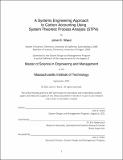A Systems Engineering Approach to Carbon Accounting Using System Theoretic Process Analysis (STPA)
Author(s)
Ward, John K.
DownloadThesis PDF (1.897Mb)
Advisor
Rebentisch, Eric
Terms of use
Metadata
Show full item recordAbstract
As the threat of climate change escalates unbound, qualitative efforts to address climate change are impeded by a fundamental challenge of quantification, overly simplified by the adage, “If you can’t measure it, you can’t manage it.” Standards and methods of greenhouse gas emissions quantification, colloquially referred to as carbon accounting, remain unsettled in consideration.
Though numerous considerations have been given to carbon accounting in the literature, little has been offered on the topic from the discipline of Systems Engineering (SE) and its practice of “systems-thinking”. Whole-system evaluation of carbon accounting has the potential to offer new perspective and insight at the macro (global, country, industry) scale, the meso (organization, project) scale, and the micro (product) scale. Review of SE tools and techniques may serve to inform, accelerate, and ultimately resolve issues of measure, attribution, and effect valuation.
This study evaluates what SE systems-thinking can offer to resolve the complexity of carbon accounting in the application of System Theoretic Process Analysis (STPA). We believe this study to be the first explicit SE consideration of carbon accounting, making only an entry into the resolution of accounting complexity by identifying system requirements, observing feedback and process model dependencies, and exposing business organization coupling. In considering future work, this study also satisfies an aim of identifying what of carbon accounting is relevant to Systems Engineering, specifically in the product development process.
Date issued
2021-09Department
System Design and Management Program.Publisher
Massachusetts Institute of Technology